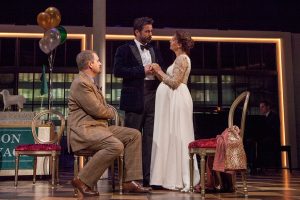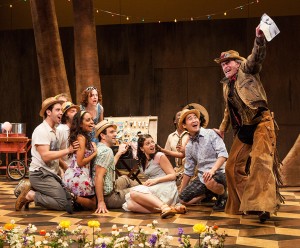The Winter’s Tale Thoughtful and Engaging at the Old Globe
The Winter’s Tale is Shakespeare in downhill gear. It was really the next-to-last play he wrote (before The Tempest) and he had nothing left to prove. The new thing of the moment was the “masque,” a fantasy entertainment involving music and elaborate décor, so he made room for some of that while adapting an old romance for his court audience.
But something caught his attention about the material and he started tweaking. Characters, as they tended to do under Shakespeare’s pen, began to come alive and bits of the old story started to vibrate with life. Shakespeare imported some masquework hits and even found room for a trained bear, known historically to have been for hire then around the London theatre.
Impatient with laying foundations of exposition, the author just leapt right to what interests him. The scenes tend to burst rather than develop. Expedience cuts the boards for the tale and coincidences are the nails used to hammer them together. The play doesn’t exactly itself shake apart but it does sort of trail away off into the golden glow of idealized romance, with an ending as happy as possible considering the major catastrophe that kicked off the play’s motor.

Paul Michael Valley, Billy Campbell and Natacha Roi, left to right, in Old Globe The Winter’s Tale. Jim Cox Photo
At opening, the kings of Sicily and Bohemia are mooning over their long and satisfying chumship, with Sicily begging Bohemia to prolong his visit just a bit longer, even pushing his pregnant Queen Hermione to persuade his fidgety guest to relent, which he does in the face of her graceful eloquence. The very next moment, after some connubial kidding, King Leontes turns aside, muttering “Too hot, too hot!” From her success at a task he assigned her, Leontes has suddenly sucked into one of the most extreme cases of jealousy in theatrical history. With no Iago to goad him, either, just a massive vortex of crippling, deadly, obviously mistaken but very public ranting over his alleged cuckoldry, Leontes bulldozes the stunned Sicilian court. Foaming with rage, Leontes orders that Hermione be thrown into a dungeon and commands his top courtier, Camillo, to assassinate King Polixenes. Camillo, having seen enough of this, hustles Polixenes out of the country, followed by Leontes’ hysterical charges of treason.
In her cell, Hermione gives birth to a daughter, Perdita. Branding the babe a bastard, the king orders another court official to take her to Bohemia and abandon her in that wilderness. Then, before Hermione’s trial, he sends representatives to the Oracle at Delphi to get the gods’ judgment on his actions.
The Oracle at Delphi? Well, why not? A handy symbol of ultimate wisdom. Very to the point: “Hermione is chaste; Polixenes blameless; Camillo a true subject; Leontes a jealous tyrant; his innocent babe truly begotten; and the King shall live without an heir, if that which is lost be not found.”
The outraged Leontes then attacks Apollo himself. But the stakes change fast. News is brought suddenly that the Crown Prince is dead. Hermione swoons and is taken off. As Leontes starts scrambling to appease Apollo, word arrives that Hermione is dead too. And Perdita, on schedule in the Bohemian wilderness, is gently parked by her reluctant but obedient escort, who is dispatched in one of Shakespeare’s most unforgettable stage directions, “Exit, pursued by a bear.”
Well, of course the babe is found almost immediately by poor but honest and, for Shakespeare’s customers, funny shepherds. Then all that’s needed is a chorus number to jump 16 years and prepare for the play’s bright second half, when a spring-like Bohemian paradise presided over by the enchanting maiden daughter of the same shepherd, madly in love with none other than the disguised Prince Florizel, son and heir of Polixenes.
It’s not hard to see where this is going and go there it does. Shakespeare reprises another of his greatest hits and introduces a Falstaffian rogue named Autolycus to dally with the clowns and introduce some mild complications but there’s never any doubt that friends will be reunited, Hermione will turn out not to have died, the two kingdoms will be joined in marriage and extra characters paired up just in time for a luxurious session of catching up.
It’s not first-class Shakespeare but it is richly satisfying anyway, full of ravishing poetry and wise to worldly ways. There are a couple of good, juicy parts and some opportunities for stage magic. It’s the sort of work that is usually neglected elsewhere but that San Diego, thanks to the precious heritage and influence of the Old Globe, knows and appreciates.
The new production at the Globe is the first staged by Barry Edelstein, now the theatre’s artistic director. It is a solid, thoughtful, engaging version which offers delights even as it falters ultimately in effect.
Edelstein uses as a framing device the doomed young prince, so cherished and then so lost, emphasizing the penalties earned by poor behavior even despite a happy ending. It is a deft and meaningful concept, as are the multitude of metronomes ticking away during the time chorus.
The director moves the action mostly in a resolutely horizontal plane across the handsome parquet floor of Wilson Chin (whose non-specific scenery meshes neatly with the Edelstein’s vision), reinforcing the dreamlike structure of the story. Like the author, he doesn’t fret over anachronisms; the oracle delivers via a reel-to-reel tape deck. He favors blackouts for featured turns – the bear business is stubbornly theatrical – and always has a natural space either for intimate conversations or broad proclamations.
What he doesn’t have is a cast that can float Act Two. Billy Campbell is a fine scenery-chewer as Leontes; Natacha Roi shows dignity, grace and fortitude as Hermione; Paul Michael Valley and Cornell Womack are polished patricians as Polixenes and Camillo; and Angel Desai plays the queen’s most loyal supporter with consuming passion.
Sixteen years later, though, there’s little continuity to Paul Kandel’s routines as Autolycus, just eccentric strutting and prissy babble. Brendan Spieth gives himself up for the lumpish bumpkin comedy and Mark Nelson is conscientious as the old shepherd but the key roles of Perdita and Florizel merely lie there. Maya Kazan displays serious diction problems that make most of her speeches all but incoherent. She’s pretty and moves well but there’s little of the brilliant, sunny charm that should illuminate the rustic scenes. Thus A.Z. Kelsey is left a moth without a flame and, though competent with the sounds, never launches entirely some of the play’s most lyrical poetry.
In fact, throughout, there are too many words swallowed and voices locked into a single tone. Sort of like Russell H. Champa’s lighting, which seems about the same wherever the action is happening. Or Judith Dolan’s modern costumes, which suggest some thankfully-abandoned idea of a Mafia theme.
But I must say that the music made up for much. There simply is no substitute for live music and the constant presence of Taylor Peckham at the grand piano enhanced everything. Even when the sound levels were unfortunate or Michael Torke’s score less than ideal, the reality was energizing. The old Shakespeare songs really don’t merge well with modern melody but when Peckham led the switch over to a rustic accompaniment of harmonium, ukulele and spoons, I was sold.
[box] Continues at 7 p.m. Tuesdays, Wednesdays and Sundays; 8 p.m. Thursdays-Saturdays; and 2 p.m. Saturdays and Sundays through March 16.[/box]

Welton Jones has been following entertainment and the arts around for years, writing about them. Thirty-five of those years were spent at the UNION-TRIBUNE, the last decade was with SANDIEGO.COM.



